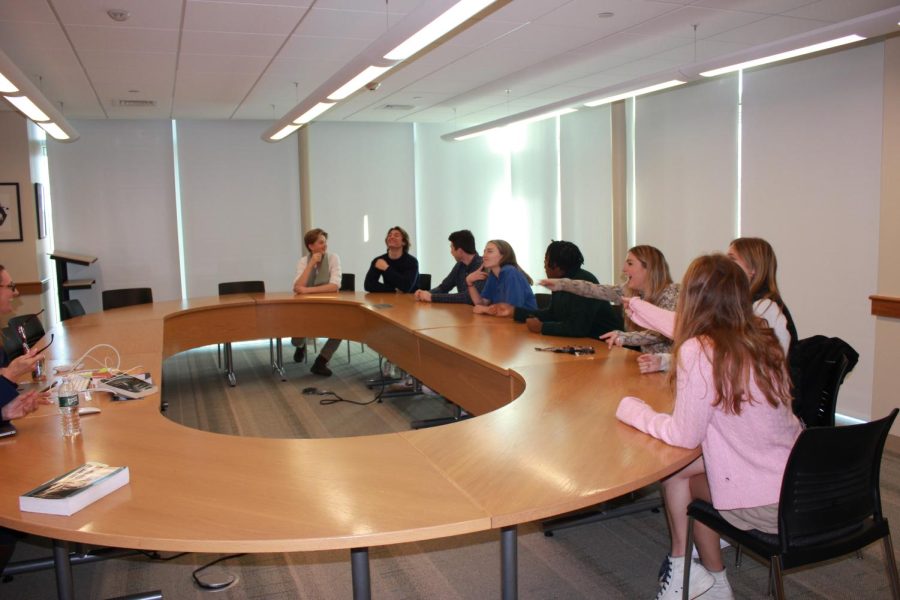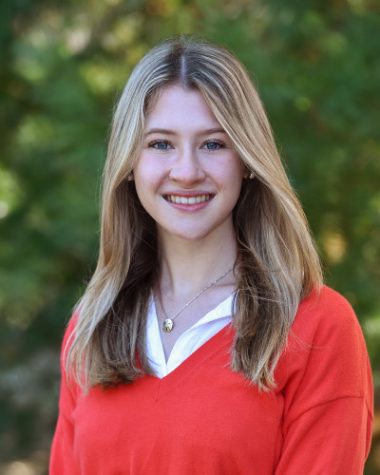Literary Scholars: A Highlight on Ale Lewis
February 17, 2023
St. Luke’s is offering the humanities-based Literary Scholars Program for the second time to seniors who love literature and seek to merge it with another discipline of interest, whether it be history, philosophy, or something else. Once accepted into Literary Scholars, students use a critical lens to develop and explore a question related to their specific interest, culminating in a final paper and a presentation delivered at the SLS Scholars Symposium in April.
One literary scholar this year is Ale Lewis ‘23. In her project, she explores the evolution of Biblical Eve. Specifically, she is analyzing how Eve is portrayed in the Hebrew Bible, Medieval artwork, and Romantic poetry.
Initially, Lewis wanted to do a project focusing on women in Greek Mythology: “I loved learning more about the evil, flawed women, like Medea and Clytemnestra. I also noticed that a lot of goddesses and sorceresses are painted as immoral, when in reality they endured a tragic past and are only looking for independence or agency in the present, like Medusa.”
However, the trajectory for Lewis’s project changed when she read Hesoid’s Pandora’s Box. Lewis realized the story was similar to that of Eve, as both concern the origin of women and how they are responsible for the fall of mankind. “I have always wanted to know more about Eve, but I never had a reason to investigate her story until Literary Scholars. So, on a whim, I deserted Greek Mythology and pivoted to Genesis,” said Lewis.
Through this pivot, Lewis developed a new research question: Does the Hebrew Bible depict Eve as a temptress who preyed on Adam, or did male translators skew the story? After diving into the topic, Lewis discovered that “misogynistic translators deserted objectivity and inserted prejudice in their translations, turning Eve’s authoritative influences into a malign influence.”
Like every advanced project, Lewis’s is not without challenges. “Learning about the Bible was so difficult! There are many different versions of the Bible, and each one has minor translation differences that alter the meaning significantly,” Lewis said.
While Lewis had trouble understanding the complexity of the Bible, she finds that talking to experts, especially those in our school, is helpful: “I met with Ms. Parker Burgard during one of my free periods, and she explained everything to me – quite literally mapped the timeline of Biblical history on the whiteboard. She also changed my perspective on the Hebrew Bible, showing me all the ways to interpret gender equality between Adam and Eve.”
To do her research, Lewis used primary and secondary sources. Specifically, Lewis used JSTOR (a research database), which contains the work of authors who dig deeper than those on Wikipedia or Google. Lewis said, “JSTOR can be overwhelming at times. The hardest part is determining what information contributes to your thesis, and what information, though very cool, deviates from your thesis. However, the more you use JSTOR, the more comfortable you get sifting through scholarly material.” In terms of next steps, Lewis will start preparing for her presentation while working on the fourth section of her paper, which focuses on Paradise Lost, an epic poem written by 17th-century poet John Milton that focuses on the Fall of Mankind. “There is so much to unpack with Paradise Lost, but I am excited to begin,” said Lewis.
When giving advice to aspiring scholars, Lewis said, “Start researching over the summer, so if you want to change topics like I did, then you have time to do so. Also, make sure the topic you choose is something you’re passionate about because the experience is much more motivating and rewarding when you’re interested in your research.”





Elaine Camerota • Mar 30, 2023 at 7:42 pm
Ale, your topic and the challenging research you’ve done is amazing. I can’t wait to see/ hear the final project. Love, Nonni